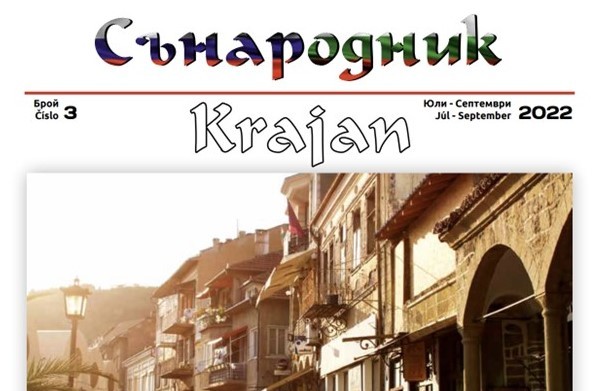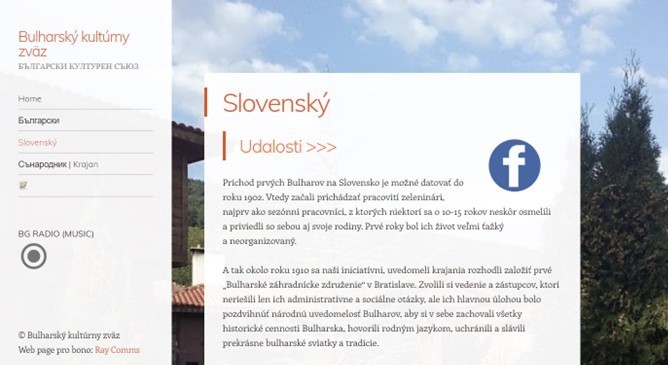Spreading Bulgarian culture around the world and preserving our national identity in Slovakia - this is what Denica Sekoulitchka, chairwoman of the Bulgarian Cultural Union in Bratislava and editor of the Bulgarian "Sanarodnik" (Compatriot) magazine , has dedicated much of her life to.
"The organisation has existed for almost 70 years. I was elected its president 6 years ago," says Denica. - As the president of the Bulgarian Cultural Union in Slovakia, I also accepted the position of editor of the magazine "Compatriot". I am not a journalist, I have a degree in mechanical engineering, but since there was no one to take over this function, I took it over. Everything we do is volunteer work - for the Bulgarian community, for the preservation of Bulgarian identity. We are lucky that Slovakia has a minority funding programme. And since we, the Bulgarians, have the status of an official minority, the Slovak state gives us a budget with which we manage to support ourselves and publish the magazine." The magazine is bilingual - in Bulgarian and Slovak. Taking over the job six years ago, Denica Sekoulitchka took this initiative to promote the history and culture of her homeland among Slovaks. "There are students of Bulgarian Studies who are helped by the magazine to learn about the language and our country," explains Denica. - It is also of help to the children from the Bulgarian school in Slovakia which is one of the three Bulgarian state schools in Europe. The magazine tells people about our traditions and customs and shows that the Bulgarian community in Slovakia is small but close-knit."
The magazine is bilingual - in Bulgarian and Slovak. Taking over the job six years ago, Denica Sekoulitchka took this initiative to promote the history and culture of her homeland among Slovaks. "There are students of Bulgarian Studies who are helped by the magazine to learn about the language and our country," explains Denica. - It is also of help to the children from the Bulgarian school in Slovakia which is one of the three Bulgarian state schools in Europe. The magazine tells people about our traditions and customs and shows that the Bulgarian community in Slovakia is small but close-knit."

Among the topics featured in the magazine are the cultural activities of the community in Slovakia, the work of the Bulgarian school and the activities of the embassy in Bratislava. The publication also covers important political events related to Bulgaria and Bulgarians, which are taking place on the territory of Slovakia. In order to attract the widest possible audience, it also has a digital version - on the website of the Bulgarian Cultural Union. 
From bulgariansinslovakia.org we also learn that the first Bulgarian settlers in Slovakia arrived there in 1902. These were hard-working vegetable growers. At first they went there as seasonal workers. But gradually many decided to take their families and settle permanently. The first Bulgarian Horticultural Association was founded in Bratislava around 1910. Its task was to raise the morale of the Bulgarians, while helping to preserve their native language and culture - something the Bulgarian Cultural Union does today.
"In 2021 there was a census in Slovakia and for the first time in the questionnaires there was a column "Bulgarian identity" - not "Bulgarian citizenship", but "identity". Which is in our favour because there are many Bulgarians who are second and third generation who have Slovak passports. According to official data, there are 1406 Bulgarian citizens in Slovakia and about 450 people with Bulgarian identity. Our community in Slovakia is not big, but we support each other," says Denica.
Theatre performances, concerts, art workshops and other events are organized by the Bulgarian Cultural Union in Bratislava throughout the year.
"Even though I grew up in Slovakia, because my parents moved there when I was seven, I am Bulgarian," Denica is proud to say. That's why I took this position - because I want to show the world what Bulgaria has to show. Our country is rich in culture, in history, in traditions. And this should be shown and promoted. This is really my mission."
Denica Sekulichka has made a home in Austria, in the "neighbouring village", as she jokingly puts it, because she lives near the Slovak-Austrian border. Her husband works in Vienna and is also Bulgarian.
They met in Denica's restaurant in the centre of Bratislava. At that time the restaurant had been bringing together Bulgarians from near and far for 9 years. Today her family has expanded with two beautiful children - one is 5 years old and the other is 1 year old. Although they have settled their family in Austria, Denica says she and her husband often think of Bulgaria. I believe that one day we will return!"
The interview with Denica Sekoulitchka was taken in Jerusalem, Israel, during the The 17th World Meeting of Bulgarian Media, organized by the Bulgarian News Agency BTA in November 2022.
A Bulgarian-designed electric vessel has gained international recognition , reaching the final round of the prestigious Gussies Electric Boat Awards 2025 . The awards celebrate the world’s most innovative and sustainable electric boats and yachts,..
A case of a dog run over by a doctor in a district of Sofia has caused a wave of public indignation and a protest in Sofia, which will take place today in front of the Military Medical Academy - the medical institution where the medic..
Forty Bulgarian schools in 22 US states have become a second home for the children of Bulgarian emigrants. They create continuity between generations and teach about Bulgarian history, traditions, and culture. They also create..

+359 2 9336 661
